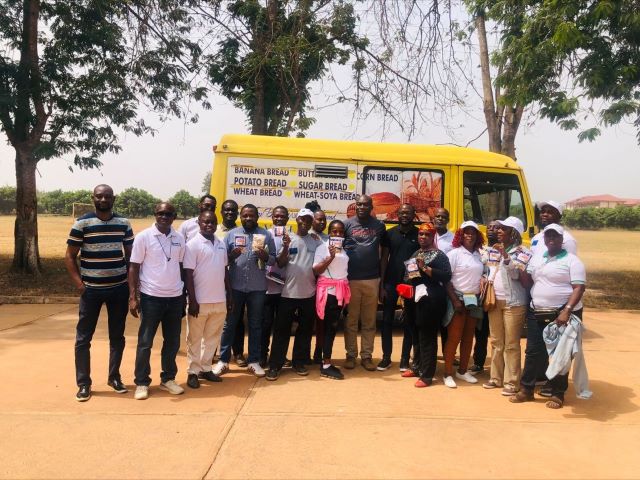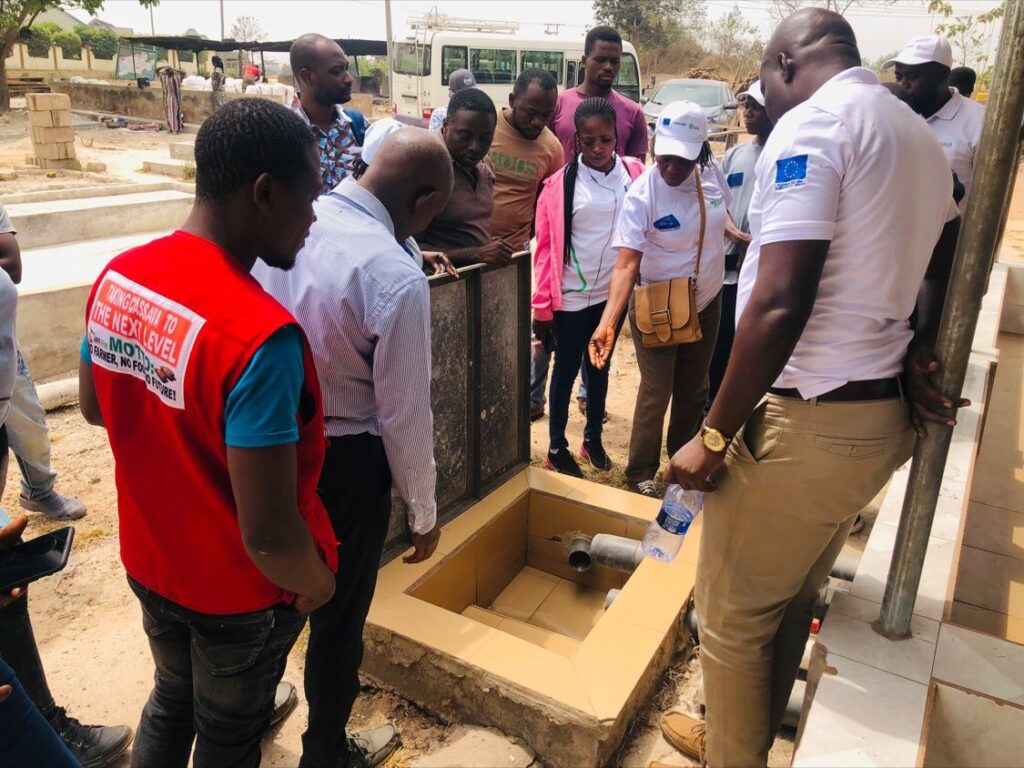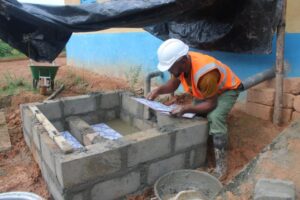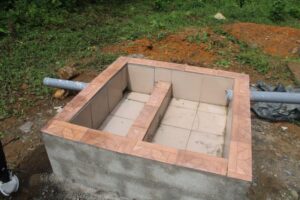In February 2024, the Cassava Transformation Project (CASTRAP) being implemented in Liberia and funded by the European Union organized a series of business-to-business (B2B) learning tours across Ghana. Ten promising enterprises from Liberia participated in these tours, with the goal of creating new opportunities for national, regional, and international market expansion and partnerships.
 During the B2B learning tour in Ghana, the Liberian enterprises had the opportunity to observe first-hand how their Ghanaian cassava processors employed a locally fabricated starch extraction units in extracting starch. This transfer of knowledge and practical exposure to starch collection methods proved to be eye-opening. Liberian participants were able to witness how technology was being used to maximize the value of cassava by efficiently extracting starch—a byproduct traditionally underutilized in their enterprises. Inspired by the success of their Ghanaian counterparts, the Liberian enterprises identified a need to adopt similar technology within their own facilities to enhance productivity and increase profitability.
During the B2B learning tour in Ghana, the Liberian enterprises had the opportunity to observe first-hand how their Ghanaian cassava processors employed a locally fabricated starch extraction units in extracting starch. This transfer of knowledge and practical exposure to starch collection methods proved to be eye-opening. Liberian participants were able to witness how technology was being used to maximize the value of cassava by efficiently extracting starch—a byproduct traditionally underutilized in their enterprises. Inspired by the success of their Ghanaian counterparts, the Liberian enterprises identified a need to adopt similar technology within their own facilities to enhance productivity and increase profitability.
 Prior to this mission, a market assessment had been conducted to evaluate the commercial potential of starch production for Liberian cassava processors. The findings highlighted the underdeveloped starch market and emphasized its potential as a profitable venture, particularly for enterprises like Lydia Enterprise in Grand Gedeh. However, many Liberian enterprises lacked the necessary technological infrastructure to fully exploit starch production. This limitation underscored the critical need for technology transfer to enable these processors to engage in commercial-scale starch production.
Prior to this mission, a market assessment had been conducted to evaluate the commercial potential of starch production for Liberian cassava processors. The findings highlighted the underdeveloped starch market and emphasized its potential as a profitable venture, particularly for enterprises like Lydia Enterprise in Grand Gedeh. However, many Liberian enterprises lacked the necessary technological infrastructure to fully exploit starch production. This limitation underscored the critical need for technology transfer to enable these processors to engage in commercial-scale starch production.
As a direct outcome of the tour, in August 2024, CASTRAP facilitated the transfer of starch extraction technology by supporting the construction of starch collection units for four key processing enterprises in Liberia: Gbawanken Tendeh Rural Women Cooperative, Middletown Cassava Farmer Association in Maryland, Self-Help Initiative Agriculture Project in River Gee, and Niapliakpo Multipurpose Agriculture Cooperative in Grand Kru County. This technology transfer is instrumental in modernizing their cassava processing capabilities, aligning them with international best practices.


The starch extraction units deployed were designed to capture starch milk generated during the processing of cassava into popular local products like gari and fufu. These units are equipped with advanced micron-sized screens to filter out fibres, impurities, and other waste materials, ensuring the production of high-quality starch. The introduction of this technology represents a significant leap forward for Liberian processors, as it provides them with the capability to produce starch at a commercial scale, unlocking new revenue streams and diversifying their product portfolios. Starch is a versatile product with applications in various industries, including food production, pharmaceuticals, and textiles, making this technology transfer a key enabler of economic growth.
 In addition to improving profitability, the adoption of starch extraction technology also reduces waste and enhances resource utilization. What was previously considered a byproduct can now be collected and processed into a high-value product, increasing the sustainability of the enterprises involved. This successful technology transfer is expected to serve as a model for other sectors, showcasing how the introduction of new technologies can significantly improve value chain efficiency and contribute to the long-term resilience of local industries.
In addition to improving profitability, the adoption of starch extraction technology also reduces waste and enhances resource utilization. What was previously considered a byproduct can now be collected and processed into a high-value product, increasing the sustainability of the enterprises involved. This successful technology transfer is expected to serve as a model for other sectors, showcasing how the introduction of new technologies can significantly improve value chain efficiency and contribute to the long-term resilience of local industries.



